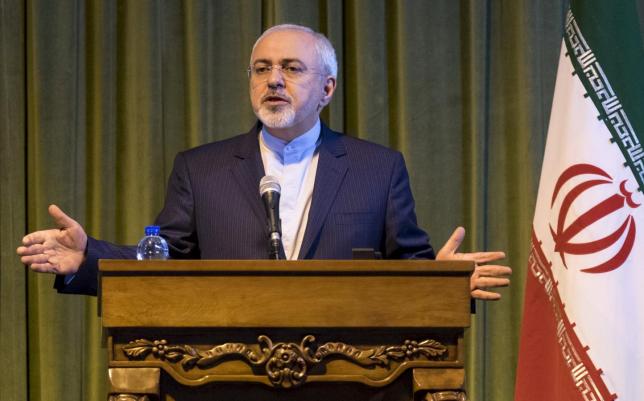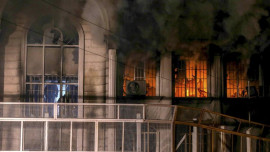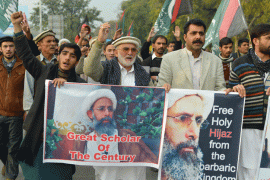
RIYADH: Tensions between Saudi Arabia and Iran erupted into a full-blown diplomatic crisis Monday as Riyadh and its Sunni Arab allies cut or reduced ties with Tehran, sparking global concern.
Following angry exchanges over Saudi Arabia's execution Saturday of prominent Shia cleric and activist Sheikh Nimr al-Nimr, Riyadh and then Bahrain and Sudan severed relations with Tehran, the main Shia power.
Saudi Arabia says 47 executed on terror charges, including top Shia cleric
European countries and regional power Turkey voiced concerns over the row, while US Secretary of State John Kerry called his Iranian and Saudi counterparts and Moscow offered to act as an intermediary. The UN envoy for Syria headed to Riyadh and Tehran to defuse tensions, and a US official said Washington was "urging calm and de-escalation".
The crisis has also raised fears of an increase in sectarian violence in the Middle East, including in Iraq where two Sunni mosques were blown up overnight and two people killed.
Saudi Arabia insisted at the United Nations on Monday, however, that the row would not affect efforts to resolve conflicts in Syria and Yemen.
"From our side, it should have no effect because we will continue to work very hard to support the peace efforts in Syria and Yemen," Abdallah al-Mouallimi, Saudi Arabia's ambassador to the UN, told reporters.
He said Riyadh would attend upcoming talks on Syria, but took a swipe at Iran's role in the nearly five-year war there, saying: "They have been taking provocative and negative positions.. and I don't think the break in relations is going to dissuade them from such behaviour."
Saudi Arabia cut ties with Iran late on Sunday, giving diplomats 48 hours to leave the kingdom after protesters -- responding to Nimr's execution -- set fire to its embassy in Tehran and a consulate in second city Mashhad.
Bahrain and Sudan followed suit on Monday, and the United Arab Emirates also downgraded its ties, recalling its envoy from Tehran.
Outrage over cleric’s execution: Protesters storm Saudi embassy in Tehran
Sunni Arab nations accuse Tehran of repeatedly meddling in their affairs, with Saudi Foreign Minister Adel al-Jubeir saying "Iran's history is full of negative interference and hostility in Arab issues".
Some 80 Saudis, including diplomats and their families, had already left Iran and arrived in Dubai on Monday, diplomatic sources said.
The Saudi civil aviation authority said all flights to and from Iran were also being suspended.
Iranian officials denounced the Saudi moves as tactics that would inflame regional tensions.
"Saudi Arabia sees not only its interests but also its existence in pursuing crises and confrontations and (it) attempts to resolve its internal problems by exporting them to the outside," foreign ministry spokesperson Hossein Jaber Ansari said.
Iran and Saudi Arabia are on opposing ends of a range of crucial Middle East issues, including the war in Syria -- where Tehran backs President Bashar al-Assad's regime and Riyadh supports rebel forces -- and Yemen where a Saudi-led coalition is battling Shia insurgents.
"A breakdown of relations between Riyadh and Tehran could have very serious consequences for the region," UN spokesman Stephane Dujarric said.
The spike in tensions comes after Iran last year secured a historic nuclear deal with world powers led by the United States, sparking major concern in longtime US ally Riyadh.
Saudi Arabia severs ties with Iran: foreign minister
The Cairo-based Arab League said it would hold an emergency meeting at Riyadh's request on Sunday to discuss the attacks on Saudi diplomatic premises and alleged Iranian interference.
Oil prices fell, and Gulf stocks tumbled, with six of the region's seven exchanges down.
Iran's President Hassan Rouhani, a moderate, on Sunday criticised those who attacked the diplomatic buildings, calling them radicals, and 50 suspects were arrested.
But the country's supreme leader Ayatollah Ali Khamenei warned Riyadh its rulers would face "quick consequences" for executing Nimr.
Some 3,000 demonstrators rallied in Tehran on Monday, chanting anti-Saudi slogans and burning US and Israeli flags.
In Shia-majority Iraq, top cleric Grand Ayatollah Ali al-Sistani called Nimr's execution "an unjust act of aggression", and on Monday blasts rocked two Sunni mosques, wounding at least three people.
Prime Minister Haider al-Abadi said the perpetrators "targeted mosques to sow sedition and undermine national unity".
Thousands of protesters rallied against Saudi Arabia in Baghdad, demanding that it sever relations with Riyadh.
Nimr, one of 47 men executed on Saturday, was a force behind 2011 anti-government protests in eastern Saudi Arabia, where Shiites have long complained of marginalisation.
Executions have soared in Saudi Arabia since King Salman ascended the throne a year ago with 153 people put to death in 2015, nearly twice as many as in 2014, for crimes ranging from murder to drug trafficking, armed robbery, rape and apostasy.






















































COMMENTS
Comments are moderated and generally will be posted if they are on-topic and not abusive.
For more information, please see our Comments FAQ